 Petzlover
Petzlover Belgian Shepherd Dog (Malinois) is originated from Belgium but Blue Healer is originated from Australia. Belgian Shepherd Dog (Malinois) may grow 15 cm / 6 inches higher than Blue Healer. Belgian Shepherd Dog (Malinois) may weigh 12 kg / 27 pounds more than Blue Healer. Both Belgian Shepherd Dog (Malinois) and Blue Healer has almost same life span. Belgian Shepherd Dog (Malinois) may have more litter size than Blue Healer. Both Belgian Shepherd Dog (Malinois) and Blue Healer requires Low Maintenance.
Belgian Shepherd Dog (Malinois) is originated from Belgium but Blue Healer is originated from Australia. Belgian Shepherd Dog (Malinois) may grow 15 cm / 6 inches higher than Blue Healer. Belgian Shepherd Dog (Malinois) may weigh 12 kg / 27 pounds more than Blue Healer. Both Belgian Shepherd Dog (Malinois) and Blue Healer has almost same life span. Belgian Shepherd Dog (Malinois) may have more litter size than Blue Healer. Both Belgian Shepherd Dog (Malinois) and Blue Healer requires Low Maintenance.
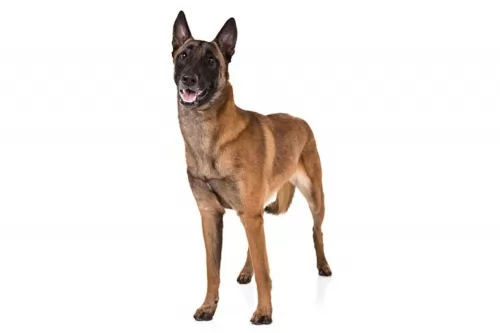 The Belgian Malinois is one of 4 Belgian Shepherd varieties. The dogs were developed- and hail from Belguim. The Malinois has a short, fawn colored coat. The American Kennel Club recognizes that the Malinois is a separate breed from the other 3 varieties. It was in 1892 that Professor Reul wrote the first Belgian Shepherd Dog standard, recognizing 3 varieties – dogs with short coats, dogs with long coats and dogs with rough coats.
The Belgian Malinois is one of 4 Belgian Shepherd varieties. The dogs were developed- and hail from Belguim. The Malinois has a short, fawn colored coat. The American Kennel Club recognizes that the Malinois is a separate breed from the other 3 varieties. It was in 1892 that Professor Reul wrote the first Belgian Shepherd Dog standard, recognizing 3 varieties – dogs with short coats, dogs with long coats and dogs with rough coats.
Today's Malinois goes back to a breeding pair owned by Adrien Janssens. It was in 1885 that he bought a fawn, rough-haired dog, breeding the dog with a short-haired dog named Lise de Laeken. After other breedings, the two dogs were recognized as ancestors of the modern Belgian Shepherd Dogs.
The city of Malines formed a club for the promotion of these fawn short hairs and the name Malinois became synonymous with them. In March 1992, the American Belgian Malinois Club received AKC parent club status.
 It was in 1802 that George Hall arrived in New South Wales, establishing 2 cattle stations. He had a problem – getting his thousands of cattle to the Sydney markets. He began looking at the prospect of a droving dog and imported a number of dogs of which a blue mottled dog emerged.
It was in 1802 that George Hall arrived in New South Wales, establishing 2 cattle stations. He had a problem – getting his thousands of cattle to the Sydney markets. He began looking at the prospect of a droving dog and imported a number of dogs of which a blue mottled dog emerged.
The dogs were crossed with dingoes and by 1840 the Halls Heelers were used by the Halls. However with the death of one of the Halls, their cattle stations went to action and the dogs, the Halls Heelers became available.
The dogs attracted attention, and the term ‘Australian Cattle Dog’ was adopted. The name referred to those dogs coming from Thomas Hall's ‘Heelers’. There have been many arguments about the origin of the breed, but the red or blue offspring known as Hall's Heelers were proven cattle drovers, and with further breeding experiments which included the Australian Kelpie, dingoes and the Dalmation, by 1893, the tough, robust working breed known as the Blue Heeler or the Australian Cattle Dog came about.
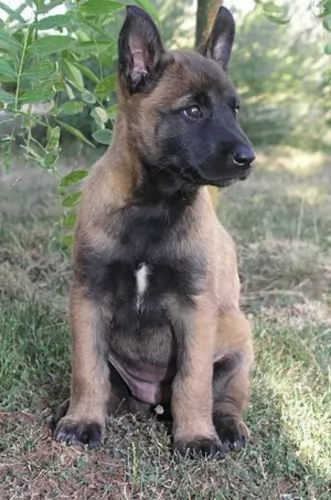 The Malinois is a medium-size Belgian shepherd dog. People sometimes mistake them for the German Shepherd as they are fairly similar to look at. The Malinois however is a smaller, lighter boned dog with naturally upright ears and a black-masked face. He is shorthaired and fawn-colored with black tips on the hairs, although other colors are brown or red too. He is an intelligent and active dog, always having been used for herding-, police- and rescue work.
The Malinois is a medium-size Belgian shepherd dog. People sometimes mistake them for the German Shepherd as they are fairly similar to look at. The Malinois however is a smaller, lighter boned dog with naturally upright ears and a black-masked face. He is shorthaired and fawn-colored with black tips on the hairs, although other colors are brown or red too. He is an intelligent and active dog, always having been used for herding-, police- and rescue work.
You’ll find the Malinois somewhat unpredictable as some are friendly and confident while other can be shy and withdrawn around strangers. This is a dog who loves to be around his human family, but to bring out the best in him, training and socialization classes will be necessary. Well-socialized Malinois are always good with children and other pets, more so if they’ve been raised with them.
 Blue Heelers are medium-sized, sturdy, compact dogs who are somewhat longer than tall. The female Blue Heeler measures roughly 43–48cm at the withers, while the male measures about 46–51cm. If your Blue Heeler is in tip top condition, he’ll weigh about 15 to 22 kilograms. They are muscular with pointed, erect ears, dark eyes and long tails which are mostly hanging downwards. Their dense coats are blue- or red speckled and sometimes with tan markings.
Blue Heelers are medium-sized, sturdy, compact dogs who are somewhat longer than tall. The female Blue Heeler measures roughly 43–48cm at the withers, while the male measures about 46–51cm. If your Blue Heeler is in tip top condition, he’ll weigh about 15 to 22 kilograms. They are muscular with pointed, erect ears, dark eyes and long tails which are mostly hanging downwards. Their dense coats are blue- or red speckled and sometimes with tan markings.
The Blue Heeler is a ball of energy and he is clever too. You won’t find him sitting around for too long, and if there is sign of a walk or a ball game, he’s in! He is an independent dog, and although he makes a wonderful family pet, he tends to attach himself to that one special person in his life. He is a natural watchdog and protector of his human family.
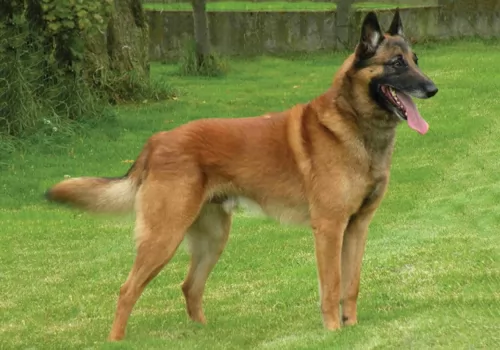 The Belgian Malinois makes a wonderful guard dog and he works hard to ensure that his human family, whom he adores, are well protected under his watch. They’re such intelligent dogs too that you may feel inclined to pass over some of your chores to him.
The Belgian Malinois makes a wonderful guard dog and he works hard to ensure that his human family, whom he adores, are well protected under his watch. They’re such intelligent dogs too that you may feel inclined to pass over some of your chores to him.
He responds well to training, and to get the best from this breed, start with training and socialization as soon as you bring your puppy home.
Socialization is excellent as it introduces your puppy to different people, animals as well as situations.
He is an adaptable dog and can live in an apartment if he is well exercised. He can be your devoted and loyal friend for a good number of years but you will have to do your part in providing him with the best care possible.
 Training and socializing of your Blue Heeler will ensure that your dog does what you want him to. The Blue Heeler is an intelligent, responsive dog and training can benefit him, turning him into an outstanding family pet, good with children and other pets in the home.
Training and socializing of your Blue Heeler will ensure that your dog does what you want him to. The Blue Heeler is an intelligent, responsive dog and training can benefit him, turning him into an outstanding family pet, good with children and other pets in the home.
He is a playful, affectionate pet who doesn’t take easily to strangers, and this is what makes him such an excellent guard dog.
Your Blue Heeler is not an apartment dog as he requires a lot of exercise, and cooping him indoors for too long with nothing to do can lead to destructive behavior.
Head-strong, independent and robust, your Blue Heeler will need a firm owner who is boss. Add to the firm owner a lot of love and care, and you’ll have a devoted friend.
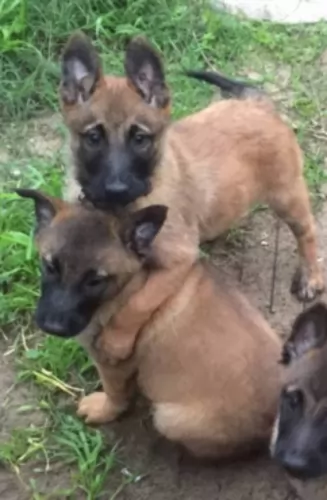 Belgian Malinois are generally healthy dogs. However every dog, regardless of breed, can pick up illnesses, and it is always wise to be aware of some of the diseases your Malinois might face.
Belgian Malinois are generally healthy dogs. However every dog, regardless of breed, can pick up illnesses, and it is always wise to be aware of some of the diseases your Malinois might face.
An inherited condition where the thigh bone doesn't fit properly into the hip joint. As the dog ages, arthritis can develop.
A degenerative eye disorder that can lead to blindness.
Brush his teeth at least 2 or 3 times a week to remove tartar build-up. Too much plague leads to inflamed gums, bad breath, pus inside the mouth and even loss of teeth.
 Australian cattle dogs are healthy and can live up to 15 years of age, but even so there are some genetic conditions that you will need to be aware of following
Australian cattle dogs are healthy and can live up to 15 years of age, but even so there are some genetic conditions that you will need to be aware of following
Eye issues which includes progressive retinal atrophy – this disease is an inherited disease of the retina of the eye where the rod cells are destined to die. Fortunately it is not painful for the dog. There are different types of inherited retinal degenerative diseases in dogs but going into detail with them is beyond the scope of this article. For more information you can chat to your vet.
Recessive piebald elleles - the Blue Heeler has recessive piebald alleles which can produce white in the skin and coat and which is linked to congenital hereditary deafness.
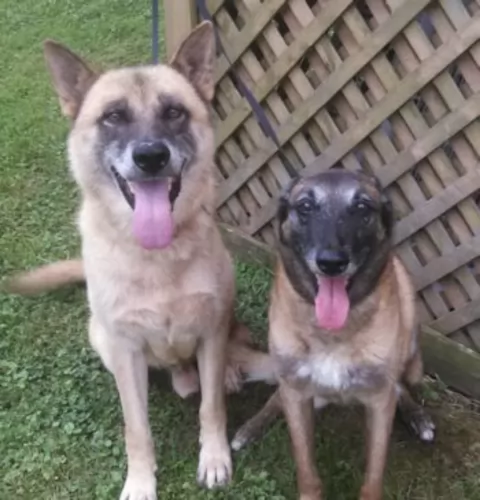 Because the Malinois is a constant shedder, with a couple of heavy shedding periods during the year, you’ll need to be conscientious with his grooming and brush him at least twice a week to get rid of loose hairs and to give his thick coat a glossy, healthy look to it.
Because the Malinois is a constant shedder, with a couple of heavy shedding periods during the year, you’ll need to be conscientious with his grooming and brush him at least twice a week to get rid of loose hairs and to give his thick coat a glossy, healthy look to it.
Because of their high energy, Malinois aren’t recommended for couch-potato type owners. It will be cruel to buy such a dog and to leave him to waste away with boredom and frustration in your back yard. He’ll want lots of rough and tumble, ball games, runs in the park or in the country and long walks.
Belgian Shepherd Malinois puppies are vulnerable when they’re tiny, and it would be wise to speak to your vet about superb nutrition to build up a puppy’s immune system.
An excellent way to ensure the health of your growing Malinois is to give him a home prepared meals along with commercially manufactured food recommended by your vet. You can’t just put a bowl of commercially manufactured dog food in front of him day after day month after month.
Apart from what your vet recommends, give him some brown rice, some cooked vegetables and some raw meat. Raw meat will ensure he can fight of skin infections. The age of the dog, emotional state and environmental influences can all play a role in skin diseases with dogs, but by ensuring some raw meat in his diet, the immune system is strengthened and skin disorders are eliminated. Always ensure a steady supply of fresh water.
 Remember that your Blue Heeler was once a full time cattle dog where he used to become totally and utterly exhausted from herding cattle. This is what he loved – the activity. If you have a Blue Heeler, you will need to provide him with plenty of exercise.
Remember that your Blue Heeler was once a full time cattle dog where he used to become totally and utterly exhausted from herding cattle. This is what he loved – the activity. If you have a Blue Heeler, you will need to provide him with plenty of exercise.
If you live on a farm, your Blue Heeler will be in his element because he can run, walk and swim to his heart’s content. If you keep your Blue Heeler in your back garden, you will need to provide him with ball games, rope games, long walks, running on a leash as you cycle and other activities.
Your Blue Heeler has a short, weather-resistant double coat. He’s not a heavy shedder, but he will have his share of seasonal shedding, so it’s a good idea to get into the habit of brushing him at least twice a week. This will get rid of all those loose hairs and keep his skin healthy by getting the blood flowing and distributing his natural oils.
Giving the best dog food for your Blue Heeler will come from either your home made food or a top quality commercially manufactured dog food. He is such a high energy dog, that your veterinarian can advise you on a dog food specially designed for high energy breeds.
These foods are well balanced and are enriched with amino acids and vitamins, promoting healthy bones and joints. Remember to include some raw meat into your dog’s diet and to ensure a constant source of cool, fresh water.
Ensure your Blue Heeler’s ongoing health by paying attention to ears, nails and teeth.